 Yoko, a European beer lover
Yoko, a European beer loverRochefortis brewed in a monastery in the south of Belgium.One of the most prestigious Trappist beer brands.
Rich, full-bodied and deep fruity flavorIt is characterized byA rich yet easy-to-drink flavorIt attracts many beer fans.
Rochefort's "8"
I actually tried it!
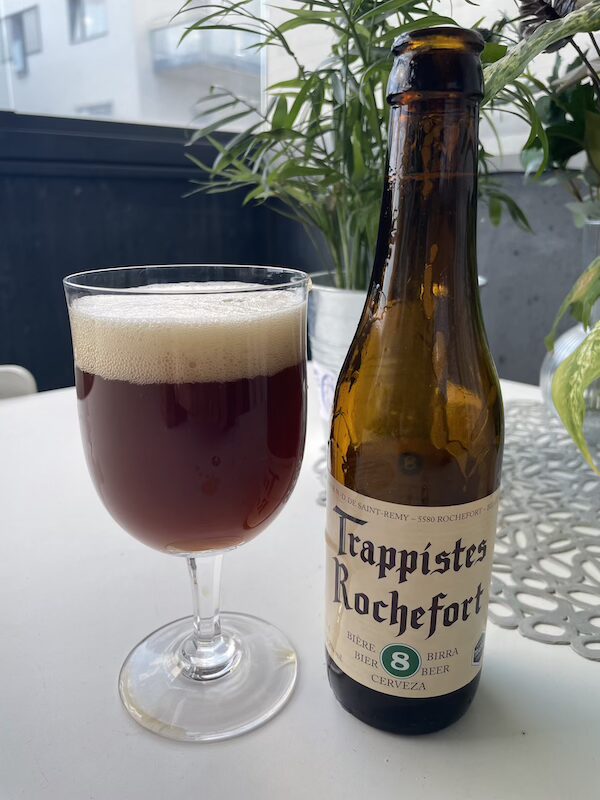




When I first tasted this beer, I was impressedRich yet soft, with a rich aroma reminiscent of fruit and caramel..
The bubbles are creamy and smooth, and the color is deep brown, so just pouring it into a glass builds anticipation.
The alcohol taste is strong,Well balanced and easy to drinkSo, it is recommended for those who want to enjoy a full-bodied beer slowly.
This is a drink with a deep, rich flavor that will become addictive.
Recommendation level: ★★★★☆ (4/5)
Links within the article
What do the numbers 6/8/10 in Rochefort mean?
Basic information about Rochefort
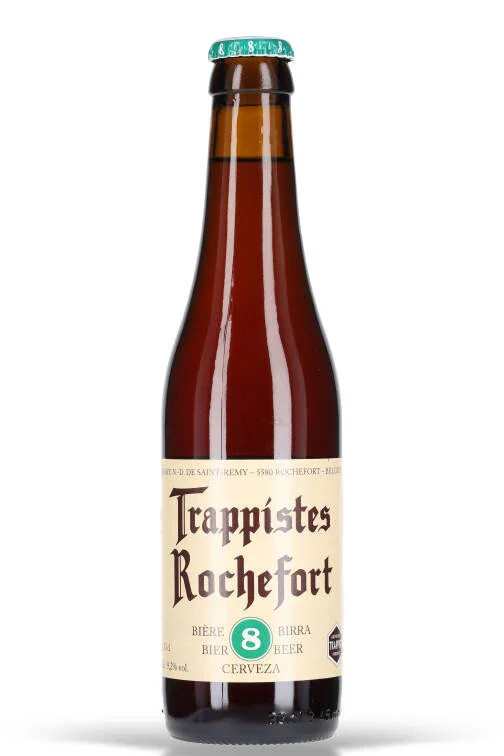

| Types of beer | Trappist Dark Ale |
|---|---|
| Alcohol content | 7.5° to 11.3° (depending on type) |
| country of origin | Belgium |
| Release year | Around 1960 |
| color | Dark brown to deep brown |
| Taste | Fruity, malty, spicy, full-bodied |
| Features | The flavor evolves through long-term aging, resulting in a powerful and complex taste. |
\ Enjoy the Belgian monastery beer tradition from just one bottle /
What is Trappist beer?
Rochefort is one of the rarest beers, recognized worldwide as a "Trappist beer."
First of all, what is a "Trappist"?
The Trappists are a Catholic religious order.Monks and monks of the Order of Cistercians of the Strict ObservanceRefers to:
This religious order,A lifestyle that emphasizes prayer, work, and strict self-disciplineIn addition, the "monastic products" produced by Trappist monasteries, especially their beer and cheese, are world-famous for their high quality.
Trappist monasteries can be found all over the world, but those particularly famous for beer brewing are concentrated in some parts of Europe, such as Belgium and the Netherlands.



In order to be called "Trappist beer", strict conditions must be met, and there are only a handful of Trappist beers in the world.
The three principles of "Trappist beer"
To be certified as a Trappist beer, three conditions must be met:
- Must be brewed on or near the monastery grounds
- Manufactured under the supervision of monks
- Profits from brewing are used to maintain the monastery and for charitable activities.



Rochefort also strictly adheres to these standards and continues to carefully brew its beer while upholding its traditions.
トラピストビールについてもっと詳しく知りたい方は、以下の記事をチェックしてみてくださいね。


The different types of Rochefort and the meaning of the numbering
Rochefort beerThe numbers "6", "8" and "10" are on the label.But thisAlcohol content guidelineIt shows:
- Rochefort 6 → Alcohol content Approximately 7.5%
- Rochefort 8 → Alcohol content Approximately 9.2%
- Rochefort 10 → Alcohol content Approximately 11.3%
This figure was once"Beer Concentration"or"Original sugar content"It is said that it was originally used to indicate the alcohol content, but nowadays it is used as a rough indicator of alcohol content.
The higher the number, the richer and more complex the flavor, the longer the aging period, and the more full-bodied and sweet the taste.
Comparison table of each beer (6/8/10)
| Rochefort 6 | Rochefort 8 | Rochefort 10 | |
|---|---|---|---|
| image | 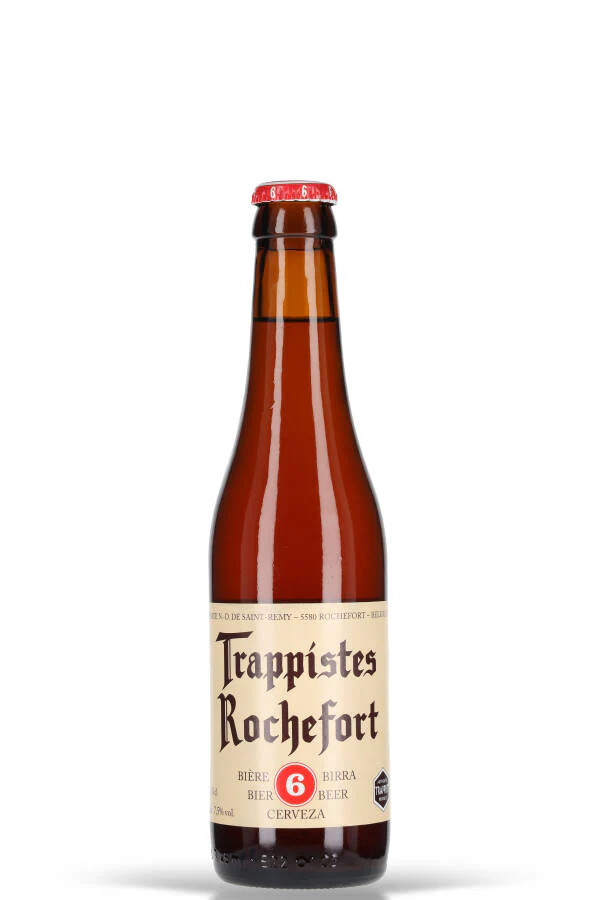  | 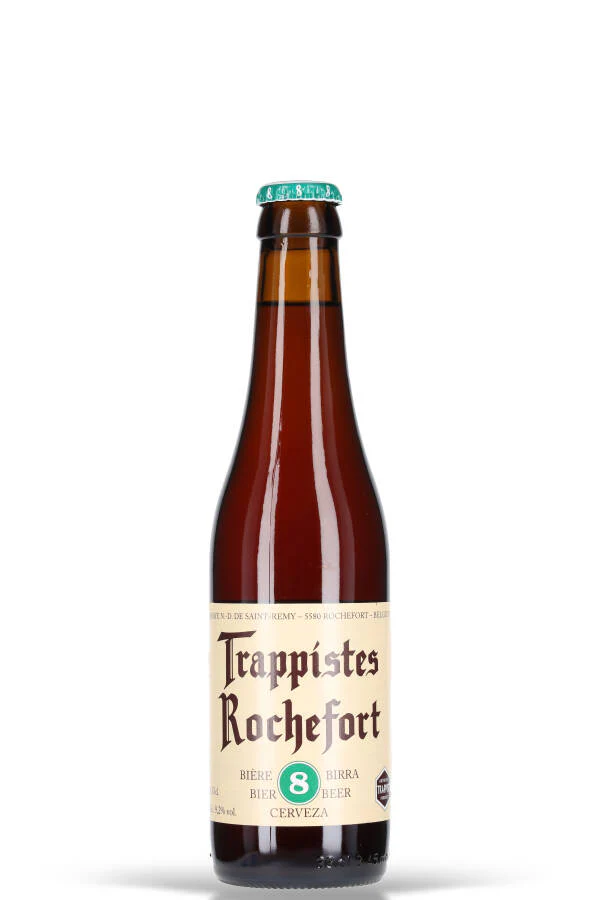  | 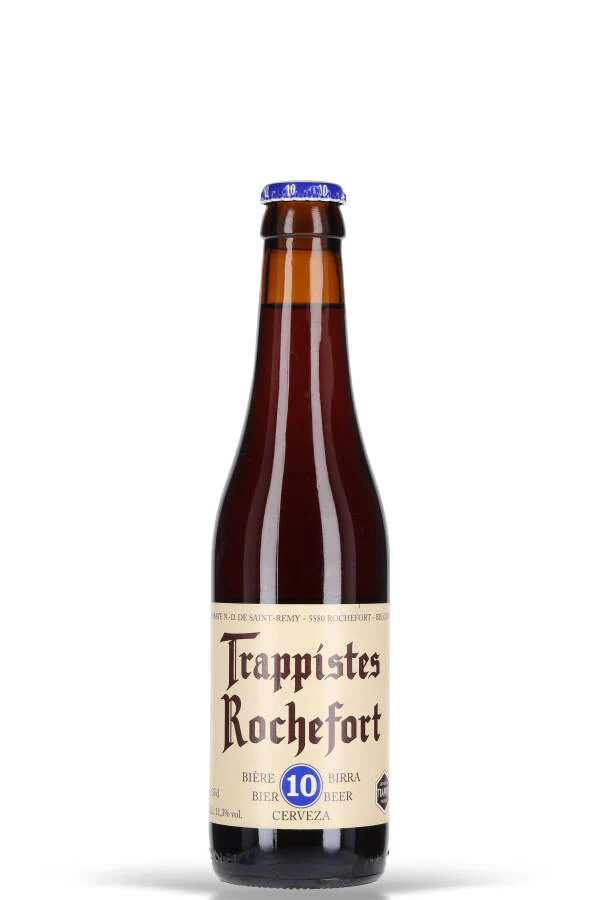  |
| alcohol frequency | 7.5° | 9.2° | 11.3° |
| color | Ruby | Dark | Dark |
| Taste | Balanced | Spicy | Roasted |
| bitter taste | ★★ | ★★ | ★ |
| body | ★★ | ★★★ | ★★★★ |



The higher the number, the more powerful and full-bodied the flavor of Rochefort.is.
Please choose according to your preference and the occasion.
The story behind the birth of Rochefort
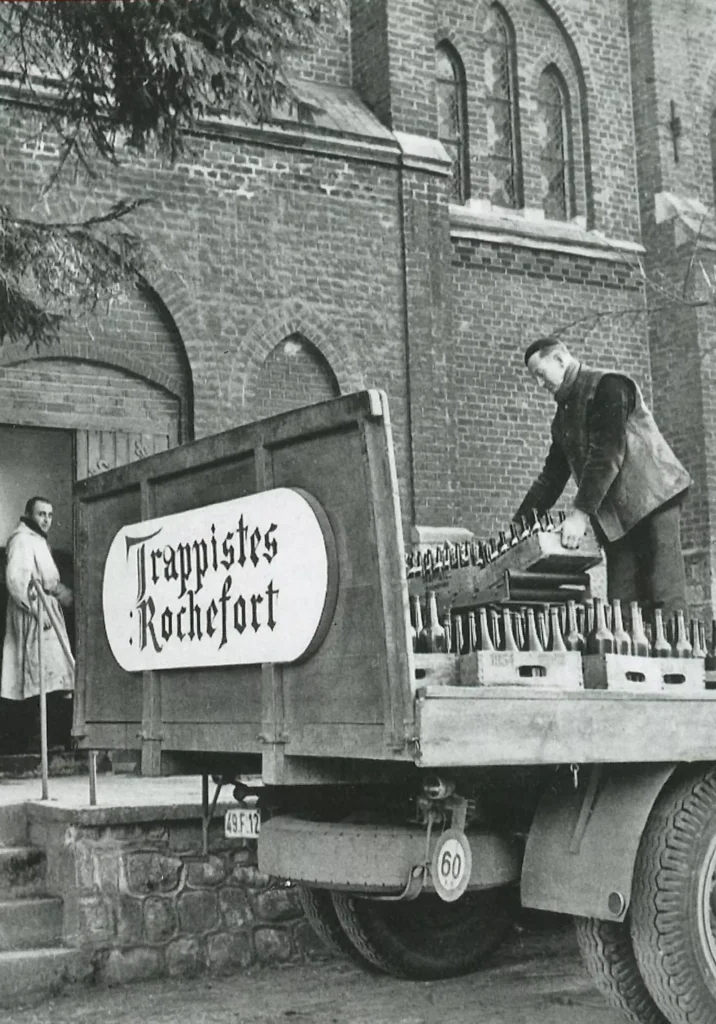

source:Official website
1. It all started with prayer and water
Rochefort Abbey was founded13th century (1230)There are records of beer brewing as early as 1595. The monks engaged in agriculture and mining with the spirit of "Pray and Work (Ora et Labora)".Water of the TridentineHowever, this would later become the "miracle water" that would play an important role in shaping the taste of beer.



The monks brewed beer for their daily food. At that time, beer was very nutritious."Liquid bread"It was consumed as such.
Beer is more than just a product.It was part of monastic lifeThat's it.
2. Beyond the Revolution, Beer Returns
During the French Revolution in 1789, the monastery was abandoned and plundered, but in 1889 the monks returned and rebuilt the church and the brewery.Serving beer since 1910In the 1950s, a full-scale brewing system was established, and the sake is still popular today.Rochefort 6, 8, 10was born.
3. Tradition × Latest Technology
In 2020, a new brewery equipped with the latest equipment was completed. While being mindful of the environment, the brewery maintains the same taste. Monks taste the brew every week to ensure its quality before shipping it out.Small-batch production with an emphasis on quality over quantityBy continuing to do so, we have earned the trust of beer fans around the world.



Despite facing many hardships, Rochefort Abbey has woven its history with faith and passion.
It's moving to think that this spirit still lives on in every glass of beer!
The meaning behind the Rochefort label
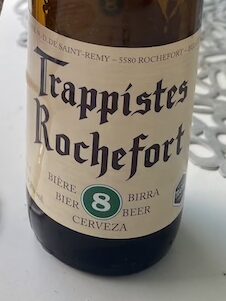

1. Traditional Typography
The font used on the label is reminiscent of medieval manuscripts.Gothic style fontThis symbolizes the monks' long-standing culture of manual work and prayer, as well as the monastic traditions that date back to the Middle Ages.
2. Meaning of the numbers (6, 8, 10)
As mentioned above, Rochefort beers have the numbers "6", "8" and "10", which indicate the alcohol content and the individual taste of each beer. This simple number notation avoids unnecessary decoration.The austere aesthetic of the monasteryIt also overlaps with.
3. Description of "Trappistes Rochefort"
The label clearly states "Trappist Rochefort," which is proof that the beer is an abbey beer that meets the strict standards of the Trappist Order.
4. Color-coded caps and letters
Each beer has a different color cap and label number color (red,green,blue) enhances visibility while also highlighting the unique style of eachSimple and functionalThis is being conveyed to



The Rochefort label is not flashy,"Sincere manufacturing," "History and tradition," and "Monk's spirit."But it is spoken quietly but powerfully.
Popularity of Rochefort in Japan and how to get it
In Japan, it is especially popular among Belgian Trappist beers.Strong support from craft beer fansThat's it.
Although it has a high alcohol content, it has an easy-to-drink taste that can be enjoyed by beer novices and connoisseurs alike.
You can purchase it at beer specialty stores, import liquor stores, and online shops, but it often sells out, so if you find it, we recommend purchasing it as soon as possible!
\ Taste and compare the traditional Belgian monastery beers /
How to taste and pair Rochefort
To enjoy the complex and deep flavor of Rochefort, it is a good idea to give some thought to the ideal drinking temperature and pairing.
Drinking temperature
Rochefort 6, 8, and 10 are all12-14℃If it's too chilled, the aroma will close, so it's best to take it out of the refrigerator about 30 minutes before drinking.
glass
The special tulip-shaped glasses and goblet shapes enhance the aroma.
Pairing
The rich and full-bodied RochefortGreat with strong-flavored meat dishes and cheesesThat's right.
| category | Examples of dishes and ingredients | point |
|---|---|---|
| Cheese | Aged cheddar, blue cheese | Richness and flavor in harmony with the fruity flavor of the beer |
| Meat dishes | Roast beef, grilled lamb | The rich flavor matches the sweetness of the beer |
| Dessert | Dark chocolate, caramel candy | Enjoy the balance of sweetness and bitterness |
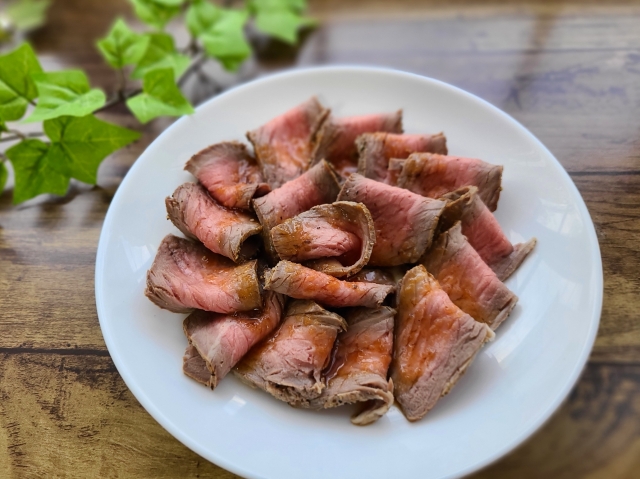

summary
Rochefort is a representative Trappist beer, steeped in tradition and history, brewed at the Rochefort Abbey in southern Belgium.
- High alcohol content, yet well-balanced with richness and fruitiness
- A traditional masterpiece that embodies the monastic history and craftsmanship
- Perfect pairing with rich dishes and cheeses
Please enjoy the charm of the flavor that deepens with each drink.
We also recommend this to those who read this article






